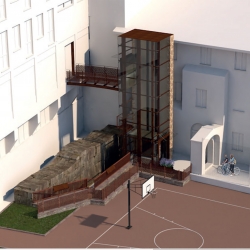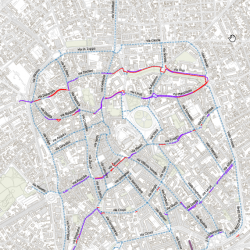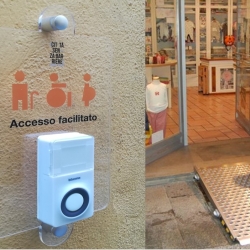
The Municipality of Spello has been participating in the debate on cities accessible to all promoted by the INU for a few years now, convinced of the need to “network”, also in terms of knowledge and exchange of experiences in order to be able to promote and implement increasingly effective urban policies for the accessibility and attractiveness of our cities.
From the Strategic Framework for the Enhancement of the Historic Centre came the projects for accessibility, attractiveness and hospitality with the aim of increasing the degree of liveability through the completion of the alternative mobility system and the improvement of…

The elaboration of the PEBA favours the improvement and greater quality of urban planning, intervention programming and design solutions adopted to make the city accessible.
Environmental accessibility is the requirement for the launch of inclusive strategies to inhabit a city that is fair and accessible to all. The intervention provides basic elements to support the strategic choices of the PEBA aimed at guaranteeing, along some of the main routes, the accessibility of routes to reach essential services, places and public buildings of greater attractiveness for all citizens.
The plan is interdisciplinary, participatory, dynamic, efficient and organic and aims at the regeneration…

Reggio Emilia City Without Barriers’ (RECSB) has been running since 2015. The project pursues the political mandate to act a transversal and inclusive cultural horizon, with the aim of creating a city that is attentive to the rights of the most fragile people, that eliminates the causes of marginalisation and discrimination, and that is hospitable and beautiful. The main objective is to approach integrated processes of sectoral policies with the direct involvement of citizenship.
The areas of intervention relate to institutional, study and research actions for: the welcoming and accessible city; barrier-free culture, art and fragility; community awareness of the…
Alessandro Bruni, Iginio Rossi, INU – URBIT
In 2021 INU first experimented with the deal for urbanism “Accessible Cities for All”. The pact must not be understood as a mere negotiation nor even as a technical exercise, but as an inescapable commitment, a political and cultural choice capable of acting positively on: the environment, society, and economy; settlement dispersions, policies, and institutions; inclusion, quality of life, fragile conditions and shattering of coexistence; relational dispersion; sectoriality and distinctness of knowledge.
Albeit fragmented, all these areas/aspects concern all-around accessibility and the networks that constitute its broader articulation. Moreover, since 2016, INU’s Project…
Vittorio Salmoni, Carolina Giaimo, INU – URBIT
Urban regeneration is the means for implementing the evolution of a city that no longer expands but transforms itself within its own limits. The improvement of the quality of life in cities is determined by several conditions among which land consumption limitation, design innovation, raising environmental quality, and the new role of public spaces.
Awareness regarding environmental, energy, and climate criticisms has increased in local communities. This increased consciousness has contributed to redefine the idea of urban quality as composed of environmental, settlement, social, and accessibility aspects that is achieved with a comprehensive strategy formed…
Edited by Vittorio Salmoni, INU – URBIT
In a fragmented and conflicting urban scenario it is crucial to plan for regeneration keeping design hallmark firmly in place by avoiding references to past models that consists of exclusively normative processes, lowered from above or facilitating substitutes or even subordinated to the composition of political agendas.
Regeneration is the tool for operating in the contemporary city, which no longer expands but transforms itself within its established limits.
Form, characteristics, and social and economic structure of places are the sphere of experimentation for regeneration models driven by different drivers. Among them, culture, especially in…


